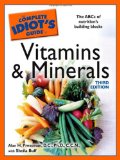|
Calcium is important for bone and teeth formation, the transmission of nerve impulses, for muscle contraction and blood clotting.
Calcium: In Depth
There is more calcium present in the body than any other mineral nutrient. There is roughly 1000 - 1500 g of calcium in an adult. About 99% of calcium is linked with phosphorous in bones and teeth making it vital for their formation and constant renewal . Calcium is what makes bones strong. Children and adolescents need a lot of calcium for their growing bones.
The rest of the calcium in the body has many different functions e.g. the signal transmission between cells, the transmission of nerve impulses, muscle contraction including the activity of the heart and blood clotting.
Factors which facilitate the intake of calcium from the intestines:
- Vitamin D (very important for the transporting of calcium), amino acids and citric acids, lactose
Factors which delay calcium resorption from the intestines:
- Oxalic acids, phytic acid, a fatty, low protein food.
Calcium: Requirements, deficiency and oversupply
Recommended Intake of Calcium according to the DGE (Deutsche Gesellschaft für Ernährung - A German Nutrition Society ) |
Age |
Male |
Female |
19 - 25 |
1 000 mg |
1 000 mg |
25 - 51 |
1 000 mg |
1 000 mg |
51 - 65 |
1 000 mg |
1 000 mg |
Over 65 |
1 000 mg |
1 000 mg |
The following are susceptible groups requiring a higher intake of calcium:
- Babies, children, adolescents: Calcium is vital for bone growth.
- Pregnant women: Calcium is needed for the growth of the baby's bones.
- Nursing mothers: 1L breast milk contains 330 mg of calcium.
- Elderly people - especially women:
Needed to help prevent osteoporosis. Calcium is released from the bones as a result of the decline in oestrogen production.
If the body is not getting enough calcium, it simply takes calcium stored in the bone tissue in order to provide the important calcium concentration in the blood for the other vital bodily functions. The strength of the bone is reduced if too much calcium is taken from the bones making it susceptible to fracture. A diet containing sufficient amounts of calcium for people of all ages is important as it can help to prevent osteoporosis. Other symptoms are muscle cramps, heart problems and high blood pressure. A calcium deficiency is usually linked to an insufficient intake of calcium with vitamin D.
You cannot take too much calcium as the body regulates the calcium levels by itself. It is usually illnesses or the intake of too many vitamin D supplements which can lead to an oversupply of calcium.
top  |
Calcium in Food:
Milk and dairy products are the main sources of calcium. In addition one can also drink calcium rich mineral water.
Calcium in 100 g foods:
Milk: 120 mg
Low-fat curd cheese: 90 mg
Camembert 45%: 570 mg
Beans: 105 mg
Feta: 450 mg
Mozzarella: 450 mg
Gouda : 800 mg
Curly Kale: 212 mg
Roquette salad: 160 mg
top 

Vitamin K2 and the Calcium Paradox: How a Little-Known Vitamin Could Save Your Life, Kate Rheaume-Bleue

Understanding Nutrition, Update (with 2010 Dietary Guidelines), Eleanor Noss Whitney, Sharon Rady Rolfes

The Complete Idiot's Guide to Vitamins and Minerals, 3rd Edition, Alan H. Pressman, Sheila Buff
|

